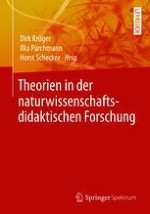2018 | OriginalPaper | Buchkapitel
4. Schülervorstellungen und Conceptual Change
verfasst von : Prof. Dr. Harald Gropengießer, Prof. Dr. Annette Marohn
Erschienen in: Theorien in der naturwissenschaftsdidaktischen Forschung
Verlag: Springer Berlin Heidelberg
Aktivieren Sie unsere intelligente Suche, um passende Fachinhalte oder Patente zu finden.
Wählen Sie Textabschnitte aus um mit Künstlicher Intelligenz passenden Patente zu finden. powered by
Markieren Sie Textabschnitte, um KI-gestützt weitere passende Inhalte zu finden. powered by
